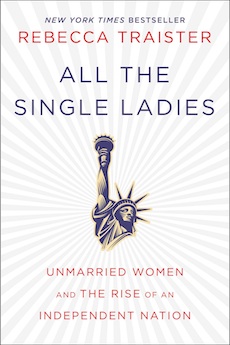By Sarah Gustafson
A quotation pulled from the pages of the New York Times in 2014 neatly sums up the baseline premise of Rebecca Traister’s All the Single Ladies: Unmarried Women and the Rise of an Independent Nation: “The decline of marriage over the last generation has helped create an emerging voting bloc of unmarried women that is profoundly shaping the American electorate.” Using swaths of the most recent statistics in conjunction with interviews recorded from 2010 to 2015, Traister (ΦBK, Northwestern University, 1997) provides a wide-ranging picture of what young women face as they try to shape lives as adults in the last decades and especially in the wake of the Great Recession. By titling her book All the Single Ladies – a clear reference, for those in her likely target audience, to the 2009 Beyoncé song All the Single Ladies (Put a Ring on it) – she does put a certain premium on “singleness” as opposed to marriage. But the book is about something more than singleness as a relationship status. It is about singleness as independence, a frame of mind that allows women for the first time to conceptualize in their youth and then realize as adults in their twenties, thirties, and even forties long periods of life lived on their own. Susan B. Anthony said in 1877 that the education and political emancipation of women would one day lead to an “epoch of single women.” It isn’t only Anthony who says this is new; the data do too. Extended periods of singleness are now not only a social norm, but the social norm for over 50% of American women. Traister calls this singleness a “liberation at the heart of our national promise… a promise of freedom that has often been elusive for many of this country’s residents.”
Traister grounds her analysis of the present day situation in literature and history, all the more fun for the gender and sexuality studies majors, nineteenth and twentieth century history buffs, Jane Austen/LM Montgomery/Louisa May Alcott fans, and a wide variety of other readers. Even Elizabeth I of England, perhaps early modern Europe’s original “single lady,” makes several appearances. But while the story she tells, and Anthony would support, is one of historically progressive freedom, it is also obvious from both data and personal experiences that these new opportunities are double-edged swords. Like the protagonist in Beyoncé’s hit, young women are not so incapacitated by social norms, lack of job prospects, or other constructs that they must stay in unrewarding relationships. As sings the superstar and advocate of her own brand of feminism, “Say I’m the one you want / If you don’t, you’ll be alone / And like a ghost, I’ll be gone.” But most women will have periods of coupledom, married or not, and the many interviews included in the book still point to marriage as the baseline expectation for most women’s adult lives. Furthermore, singleness is hardly a panacea. It can be, to use Traister’s words, “punishing” and “lonely” — particularly for the many millions below the poverty line or who are single mothers.
Traister is remarkably attentive to race, gender, and socio-economic intersectionality, and her book is stronger for it. She dedicates major sections to the varied experiences of rich vs. poor women, white vs. minority women, college-educated vs. not, and even perhaps the most marginalized female population, those without a sex life, vs. those with a partnered sex life and vs. those who fit the “Girls gone wild” mold. If the book could be faulted for something, it is for Traister’s failure to realize it might be read by non-liberal women. Here, her intersectionality comes to a halt. She is not forgiving of conservative politics or politicians, expends a lot of energy criticizing male conservative scholars and pundits (conservative female thinkers are barely cited), and makes little effort to bridge to center-right or conservative readers who may have a difference of opinion about abortion, for example, but otherwise have experiences that resonate with what Traister portrays. This lack of awareness is disappointing. Even if women on the right may disagree with some of the proposals for reform Traister outlines in the Appendix, her call to make government and the welfare state work as well for the single as for the married could have many advocates in non-left circles. That it could have advocates from the non-left is a tribute to the great majority of the book. It is a great read, and highly recommended for those of any and all political stripe.
Sarah Gustafson (ΦBK, Davidson College, 2014) has a master’s degree in history of political thought and intellectual history from University College London, where she won the Quentin Skinner Prize for her dissertation on Alexis de Tocqueville. Currently based at the American Enterprise Institute, she looks forward to her pursuit of a PhD in European and intellectual history.




